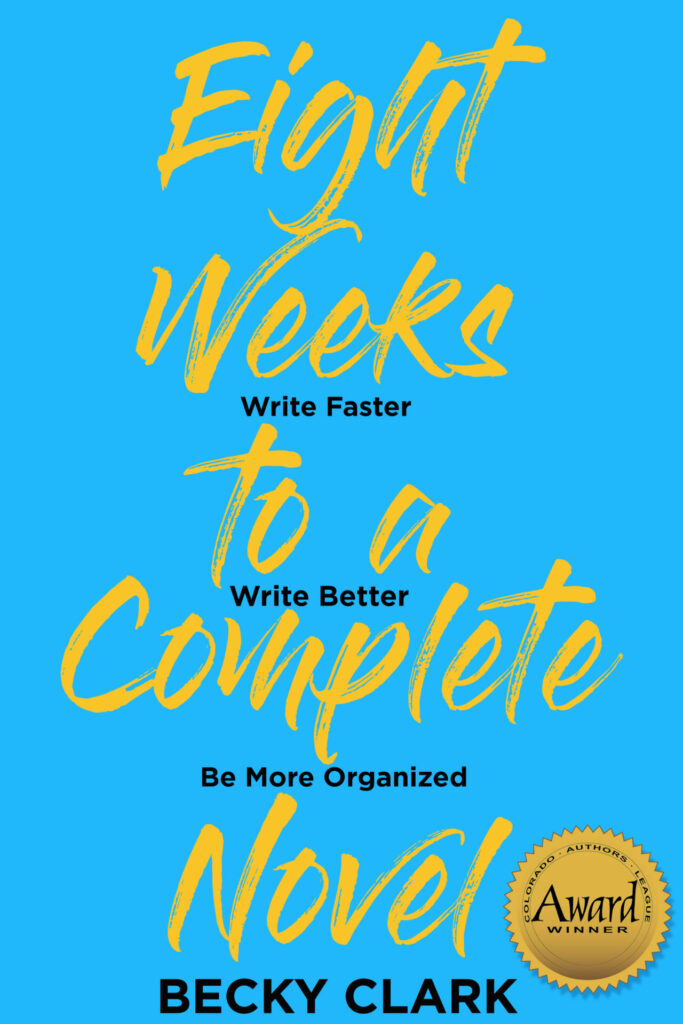Whether you’re a reader interested in the writing process, or someone exploring NaNoWriMo for the first time, or a seasoned writer looking to speed up your process, you’ll find something to love about Becky Clark’s “Eight Weeks to a Complete Novel.” This short blog series will get you started.
Up front I should confess that I hate revision with the white-hot intensity of ten thousand suns. You might have read that somewhere. In the past, I’ve had to pull a single plot thread from a manuscript, only to watch in horror as the entire story sweater puddled at my feet. Revision renders me so desperately unable to function that all I can do is crawl back into bed and hibernate until someone sweeps the pile of threads away. But nobody ever does that. I’m always on my own. And I don’t like it.
Other writers have told me they struggle through the first draft as if on a forced march through quicksand carrying a squirmy toddler wet from a bath.
They get excited about finally writing THE END so they can gleefully toss those pages into the air—sometimes literally—and then rearrange everything.
The idea of that makes me throw up in my mouth a little bit.
I said I don’t like revision, but let’s define some terms. I don’t like the kind of major revisions where you subtract characters or subplots, or where you get to the end and find out no, he wasn’t the bad guy after all … it was her! Or this shouldn’t be set in Victorian England … it’s a space opera set two hundred years in the future!
I’m feeling faint just saying that.
The type of revision I love, however, is the layering. Where you have the bones of your story and you get to go back and add layers of description, theme, humor … whatever it is that makes your story yours.
That’s why I shoot for about 60,000 words in the first draft. I typically write lighter mysteries, which clock in at around 75,000 words at publication. Some are shorter, some are longer, but this is what I aim at for mine.
Other genres and subgenres are different. They all have their rules, and, of course, publishing houses have their rules as well.
I try to hit that 75k by the time I do my final polish. Because I like that layering, I prefer to err on the side of a lower word count. Adding words is so much easier than subtracting them. Seasoning a stew a bit at a time is much easier than dumping in too much paprika. There’s no easy way of unpaprika-izing your stew. Don’t ask me how I know this.
My eight weeks looks like this:
Week 1 —outline and synopsis
Week 2 — write
Week 3 — write
Week 4 — write
Week 5 — write
Week 6 — editing
Week 7 — editing
Week 8 — final polish
I often use “outline” and “synopsis” interchangeably. That’s because, to me, they’re kind of the same document. Technically, though, you begin with the outline which is sparse. It gets fleshed out into the synopsis, which is a more complete version of your outline, in paragraph form. My outlines are 5-ish pages which morph into a 30-ish page synopsis. So, when I talk about a “30-page outline,” don’t have a cow, man.
I typically only write two or three hours a day on the days I write, but I don’t put any time parameters to creating the outline and synopsis in Week 1. That’s because I spend as much time as I can on the beats of my story in that first week. I find it the most fun, discovering where my story actually is and thinking about all the different directions the plot can go. I enjoy the writing and editing parts too, but I find them more difficult and demanding. Kind of like leafing through a cookbook versus settling down to prepare something for dinner. All these food references. I must be hungry.
This outlining and synopsis phase is where I’ll add extra time if I have that luxury.
Sometimes we need something new to shake us out of a rut or to show us we can do something we’re not convinced will work. If you’re a writer, you wouldn’t be reading this if you had a system that was working for you. And admit it … you’re curious. You want to see if you can challenge yourself this way. That’s perfectly fine. Multitudes of successful projects have begun with a dare. The moon shot. Silicon Valley businesses. My haircut.
I’ll probably say this forty-leven gazillion times. My specific way won’t work for everyone. You need to put your special spin on it, playing to your strengths and accommodating your weaknesses. But until you know what exactly those strengths and weaknesses are, you’ll just be dog-paddling in the Eight Weeks pool.
Next article … The Writer’s Mobius Strip
• The Writer’s Iceberg
• The Beauty of Calendars
• I Hate Revision with the White-Hot Intensity of Ten Thousand Suns
• The Writer’s Mobius Strip
• Perfect Your System
• Find the Fun

“Whether you want to write a novel in 8 weeks is up to you but even if you can’t make that kind of commitment to writing, the planning techniques presented here will help you devote more focused and better time to your writing project.”
“So awesome I don’t even know where to begin.”
“Must-read for any writer–highly recommend!”